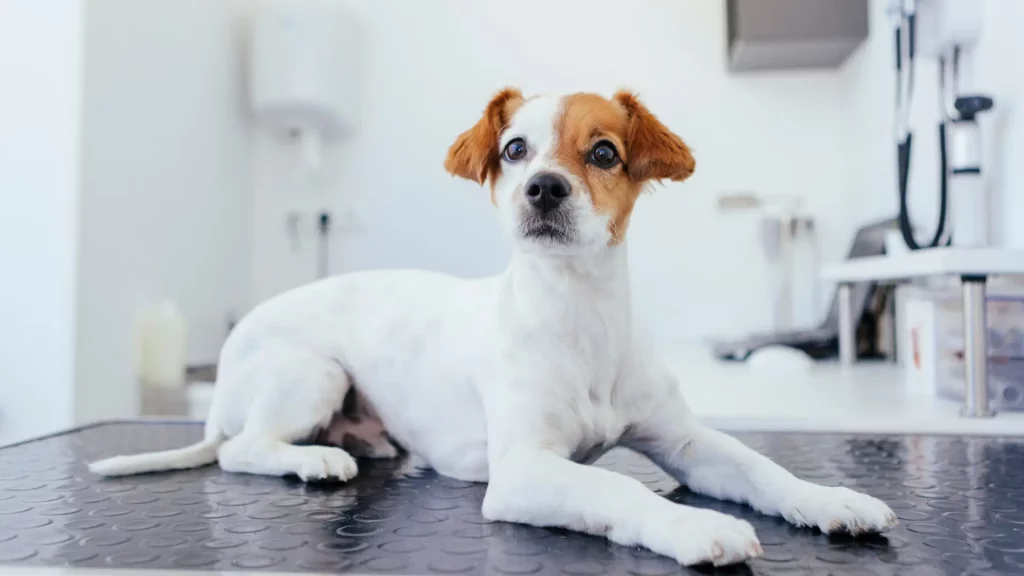Receiving a diagnosis of cancer in your beloved dog or cat is understandably upsetting, stressful, and scary. While getting this diagnosis is difficult, the next steps do not have to be, and the oncology team at New River Veterinary Specialists is here to help. Dr. Sarah Marnin will work closely with you and your pet to find the most compassionate and evidence-based treatment protocol to treat their disease and improve quality of life.

A consultation appointment with our team will involve a thorough discussion of your pet’s medical history, any medications they are currently receiving, a complete physical exam, and a detailed discussion of your pet’s cancer diagnosis.
Additional testing recommendations and treatment options will be presented in an informative and supportive environment. A typical consultation appointment lasts anywhere from 1-2 hours. Depending on the tumor type, additional tests needed, and treatment path selected, the visit may be extended for the full day. This will be discussed during the consultation but you may want to allow additional time in your schedule.
New River Veterinary Specialists diagnose and treat a variety of cancers including lymphoma, osteosarcoma, hemangiosarcoma, skin tumors, mammary tumors, lung tumors, gastrointestinal tumors, endocrine tumors, and many other cancer types.
Cancer treatment in our pets is very different from humans. Our goal is to give your pet a good quality of life for longer than if no treatment were pursued. The treatment for the cancer should never be worse than the disease itself. By working with Dr. Marnin, our oncology team will tailor your pet’s treatments to improve their quality of life, minimize their time at the hospital, and maximize time at home.


Chemotherapy is drug therapy designed to kill or slow the growth of cancers. Many of the drugs used to treat cancer are derived from natural substances such as plants, trees, or even bacteria. These are often the same drugs used in human medicine, but there are chemotherapies that are specific to veterinary patients.
Administration of chemotherapy is dependent on the particular chemotherapy drug. Some are only available as an injection, whereas others are available only in pill form.
Intravenous (IV) drugs: An IV catheter is placed for safe administration of the drug. After the drug is given the catheter is removed and a light bandage is applied. The bandage may be removed 1-2 hours after the drug is administered.
If your pet licks the injection site longer than a day or if the site turns red or bruised, please contact us or your family veterinarian immediately.
Oral drugs: These are usually administered by the owner at home but can be administered in the hospital. It is important that your pet receives all medication as prescribed, and the pills are not crushed or split. Drugs in capsule form must never be opened.
To administer the chemotherapy pill, it is helpful to use pill pockets you can purchase at any pet supply store. Or you may wish to coat the pills with peanut butter or cream cheese to mask the bitter taste of the medicine. If you are administering an oral chemotherapeutic drug, you MUST wear nitrile gloves when handling pills. After treatment, remove the gloves and wash hands with soap and water.
Your pet’s regular urinations and defecations can be disposed of/handled as normal, but if there is an “accident” in the house or car, wear gloves and clean the area with disposable items (paper towels, etc.), wrap in a separate plastic bag, tie off and then dispose in the trash. Wash your hands thoroughly following cleaning. For soiled clothing or bedding, these should be washed twice in hot water, ideally with bleach.
In veterinary oncology we use relatively lower doses of chemotherapy compared to human oncology, so the rate of side effects is much lower in our patients.

Copyright 2025. New River Veterinary Specialists. All Rights Reserved.
Privacy Policy. Site by group46
DVM, ACVIM (SAIM)
Internal Medicine
Dr. Adam Hunt is an internal medicine specialist at New River Veterinary Specialists. He is a 2018 graduate of Virginia-Maryland College of Veterinary Medicine. Dr. Hunt completed a small animal medicine and surgery rotating internship at Kansas State University and his small animal internal medicine residency at University of Tennessee. He received the House Officer of the Year award at Kansas State University due to his passion for teaching.
Dr. Hunt’s special areas of interest are gastroenterology, endocrinology, autoimmune diseases and infectious diseases. His area of research is in feline gastrointestinal disease and its relation to anemia and the diagnosis of commonly acquired adrenal diseases. Dr. Hunt enjoys performing all procedures in the specialty of internal medicine but particularly enjoys upper and lower GI endoscopy. He enjoys the long-term management of multifaceted cases and building relationships and bettering the health of his patients. Dr. Hunt views each case as an opportunity to educate and involve his clients in the decision making process with their beloved companions.
In his free time, Dr. Hunt enjoys spending time outdoors with friends and family. He enjoys hiking, swimming, spending time at the beach and playing soccer. He shares a home with his wife, two dogs, and a cat.
DVM, DACVIM
Oncology
Dr. Sarah Marnin is an Iowa native and graduate of Iowa State University College of Veterinary Medicine. She continued her veterinary training with a one-year rotating internship at Friendship Hospital for Animals in Washington D.C., followed by a one-year oncology specialty internship at Mississippi State University College of Veterinary Medicine. Dr. Marnin then remained in the Southeast for a three-year oncology residency at the University of Tennessee, and she looks forward to calling the Southeast home for a while longer with joining the NRVS team.
Dr. Marnin enjoys all aspects of oncology with a particular focus on palliative care and quality of life for both her patients and their owners. Her approach to the practice of oncology is to ensure families feel educated, informed, and supported when navigating the difficult and deeply emotional process of cancer care. She highly values the human-animal bond and wants all pet families facing cancer to know they’re not alone in this fight.
Outside of work, Dr. Marnin enjoys reading, cooking and traveling with her partner. She and her partner also love taking their golden retriever, Knox, to the beach, or relaxing at home with their three cats – Prudence, Persphone and Nina.